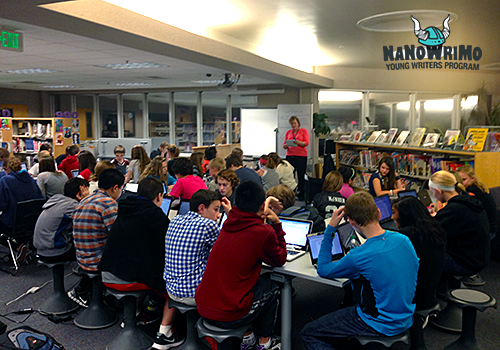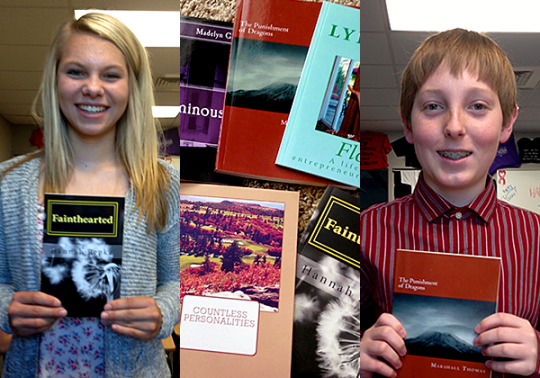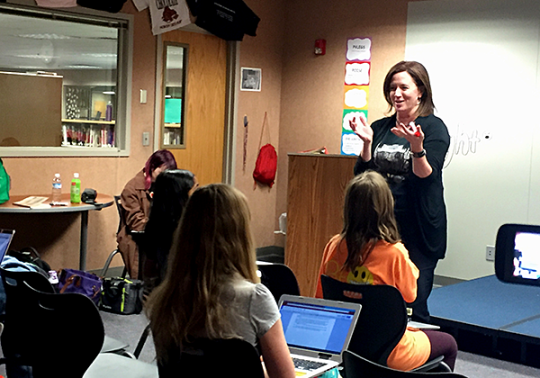Chris Baty's Blog, page 144
May 18, 2016
Why Revision Is Just a Matter of Problem-Solving

You wrote a novel! Now what? Today, author Jane Glatt , shares the process of learning how to revise a draft… and why it’s just a matter of problem-solving:
Congratulations! You did it! You wrote your novel—you finished it and wrote THE END in all caps. There’s nothing left to do except pat yourself on the back and celebrate. Throw a party, eat cake, have a glass of wine. You did it!
You wrote your novel and every single word is perf—oh, wait, maybe not every single word is perfect. And there might be a scene here or there that doesn’t quite work the way you want it to. And your wonderful, heroic protagonist—did they struggle against great odds? Did they scrape through by the skin of their teeth or were they so fabulous that they made things look easy? Maybe too easy?
Congratulations. You wrote your novel and now you’ve made it to the next stage: revisions. You absolutely should celebrate—but you’re not done. Your novel isn’t yet the best it can be.
Revisions are hard but remember that you’ve already done the impossible—you’ve faced the blank screen and like the true magician you are, you’ve created something—a story—out of nothing. If you can do that, revising doesn’t sound so difficult, does it?
I think of revising as problem solving. And before you say you’re terrible at solving problems, I’ll remind you that you just wrote a novel. You created a bunch of problems that your protagonist had to solve in order the get the one thing they want/need/can’t live without in their fictional life. You are a great problem solver.
All you have to do is figure out what the problems are. And that—figuring out what needs to be fixed—is a skill that can be learned. Just as it took some time to learn how to write a novel, it might take some time to figure out how to revise one.
But there will be things that clearly need work. Start there. Once you make one change, don’t be surprised to find that another problem—and the solution—presents itself. Before you know it you’ll have reached that THE END again.
And now you know you’re not done. Or maybe you are? In either case one more read through won’t hurt. And you’ll very likely notice something else that doesn’t quite work; something you missed earlier. You are learning a new skill, after all.
But don’t give up. You didn’t when you were writing a novel so don’t give up during the revision process. I did ten revisions of my fantasy novel Unguilded. If I’d stopped at six I wouldn’t have been published, the second book in the series wouldn’t be published May 2016, and my next book wouldn’t be scheduled for fall 2016. I didn’t give up. And neither should you.

Jane Glatt is a fantasy novelist and the author of The Mage Guild duology. Unguilded was published in 2015 and The Unmage in May 2016 and earlier she self-published the Brotherhood of the Throne trilogy. Jane loves that writing fantasy allows her to indulge her curiosity about an eclectic group of subjects. So far she’s done research on synesthesia, tidal rivers, cities atop bridges, guilds, Ojibwe mythology, pirates and privateers, plants used for healing and the history of spying.
Top photo by Flickr user jurek d.
May 16, 2016
Young Writer Chronicles: Writing for the Joy of It

Every November, our Young Writers Program works with 100,000 students and educators, and 2,000 classrooms around the world. Today, Judi Holst,
a Public Speaking teacher and Literacy Specialist at Rocky Heights Middle School in Colorado
, shares how NaNoWriMo works in class… and as an after-school club:
I started using NaNoWriMo about five years ago as part of my advanced language arts class. I strongly believe in real-world projects for students, so I was drawn to having my students write a novel in a month in order to become a published author.
I only offered it to my advanced students for a couple of years, until I started noticing the students in my other classes were showing interest. Then I created a unit for all of my classes, in which NaNoWriMo was one of the options.
Each November, on the Friday before Thanksgiving week, I hold a “NaNo Night.” The students stay with me from 3 PM to 8 PM in order to write their novels. They love having the whole school to themselves. I invite a published author to come in to do a writing workshop, the students spend time writing and sharing their novels, they eat a ton of food since we have pizza delivered, and we dance to work off the calories. I always have high school students who participated in NaNoWriMo in my class previously volunteer that night, also. It is exhausting, but it becomes one of the students’ favorite memories each year.
“I have had a student publish three more books on her own since [NaNoWriMo].”

Another favorite moment is when students bring in their published novel to show off to everyone. The smile on their face is priceless. For the past two years, students have started selling their books on Amazon, and we have had a few make over a hundred dollars within the first month. I have also had a student, Alana, publish three more books on her own since then. Since she learned the publishing process in my class, she took all of her blog entries from 8th grade (about the life of a middle schooler), and she published them in a book to give her teachers and sell on Amazon. It is one of my favorite books to date.
“I love when I can see my students working on their novels on the weekends or at night; they are writing for the joy of it at that point.”
My advice for educators interested in teaching NaNoWriMo is to start small and use the lessons that are offered on NaNoWriMo’s Young Writers Program website. The lessons are well thought out and easily adaptable for the level of your students. The forums on the website are a great place to post your questions for other teachers.
I wouldn’t make NaNoWriMo a requirement for all of the students, though. It is a huge undertaking for students, and some would be just as happy to enter a contest for short stories. I also start a blank document for each student on Google Classroom, so that I can access their novels throughout the year. I love when I can see my students working on their novels on the weekends or at night; they are writing for the joy of it at that point.
I know that some teachers will have a difficult time dedicating an entire month to NaNoWriMo. However, my students learned a writing mini lesson each day, and they still read their literature circle books throughout the month.
I also started a NaNoWriMo group for teachers on Edmodo. They can access it here. They can access some of my materials in the folder and ask their questions.

“I decided to start an after-school [NaNoWriMo] club that is open to 6th, 7th, and 8th graders this year.
“
When I left the language arts classroom in order to teach speech as an elective, many of my past students were horrified that NaNoWriMo wouldn’t continue, so I decided to start an after-school club that is open to 6th, 7th, and 8th graders this year. Within the first few weeks, we had 60 students sign up. Luckily, I also had another teacher volunteer to help out with the club.
This semester, since NaNoWriMo is in November, we work on editing, getting peer help, and polishing their book for publication. So far, I have had two authors come in to do a writing workshop (they even came for free). Students love to hear advice from “the pros.”
Last week, I asked the students why they signed up for our second semester club, and this is what they told me: most of them are excited to publish their book by the end of the year, but they also come for the time to write with friends, they get to hang out with their high school friends (my fabulous volunteers), and the raffle.
For the first semester, students would get a sticker and raffle ticket for every 1,000 words that they wrote. At the end of each club meeting, I hold a raffle of items that were donated. I put out a request to staff at our school and my family for any items they would like to donate to the raffle. You would be surprised what middle schoolers still consider exciting. Since this is a club, and not for class, the students enjoy that they don’t have any guidelines to meet.
I can honestly say that I look forward to NaNoWriMo Club each Thursday. The students are excited to be there, and their excitement is contagious.

Judi Holst is a Public Speaking teacher and Literacy Specialist at Rocky Heights Middle School in Colorado. She is a Gifted and Talented Lead for her district and an Edmodo Certified Trainer. She has been teaching for 24 years and has taught grades Kindergarten through 8th grade. She has presented at AMLE, the Digital Age Teaching and Learning conference, the International Reading Association conference, the Colorado Council International Reading Association conference, and she is presenting at ISTE this summer.
May 13, 2016
3 Tips for Parent Writers

Writers come in all shapes and sizes, from every context and background. Today, Shauntea Gauthier, a NaNoWriMo participant, shares what it means to be both a writer and a stay-at-home parent:
If you are a stay-at-home parent and a writer you are doing two jobs that:
a lot of people who haven’t tried doing either already think they can do better than you, and don’t pay enough.The internet is sprinkled with sage advice like “sleep when the baby sleeps”. Parents like me laugh and laugh and laugh. I have two toddlers and a third-grader. There is no “sleep”. There are also no lunch breaks, commutes, weekends, or vacation days.
If you can’t use the bathroom in peace, how are you supposed to get this writing thing done?
Tip 1: Ditch the guilt.“Show, don’t tell” is a staple of writing advice clichés, and what are you showing your kids by continuing to write? That hard work pays off. That their dreams are worth chasing. That’s what you do by nurturing your craft.
You show them what work ethic looks like. You show them that parents can have fulfilling careers and love their kids. You show them that you believe in yourself. When you tell them these things later, they will know you mean it. Give yourself permission to write.
Tip 2: Ask for help.Accept help. Use some of the time you spend waiting in lines to scribble on a notepad. Pay for help if you can, even if it’s asking someone to watch them while you’re home or at the park.
If you have a working spouse, remember that it’s their job to be a parent, too. If you haven’t asked them to take over in a while, it might be hard to ask, but everyone will benefit in the long term. Accept that it will take some time and many adjustments to get a workable schedule going.
Tip 3: Reward everybody.Let your kids know at every break that they are great at behaving while you work. Just like you deserve a treat when you write, kids deserve something that only happens when you write. Try a favorite movie, a favorite toy, or an activity that doesn’t require you to help. This is a special occasion.
When you’re done for the day, whether it’s twenty minutes or two hours, reward everyone with a “together” activity. Being consistent is hard but it is the only thing that kids of all ages respond to.
Bonus Tip: Parenting and writing are similar in a lot of ways. You have started a brave and difficult journey, and no one seems to care. Remind yourself frequently to try again. You are not alone. The journey is worth it.

Shantea Gauthier is a novelist and a Californian; not necessarily in that order. She has a passion for dance, movement, and writing people who act like people (even if they aren’t always human). The only way she can get a first draft done is a NaNoWriMo gun-to-the-head style deadline. Find her books on Amazon. See what’s new on her Facebook page, and follow her on Twitter.
May 9, 2016
Young Writer Chronicles: Students Around the World Discover a Love for Writing

Every November, our Young Writers Program works with 100,000 students and educators, and 2,000 classrooms around the world. Today, Nate Fleming, author and educator in Shenzhen, China, shares how he’s watched young writers blossom in international schools:
I fell into NaNoWriMo backwards, through Script Frenzy, a program sponsored by the nonprofit behind NaNo from 2007 to 2012. In Script Frenzy, a writer would write the first draft of a screenplay over the month of April. At that time, I had aspirations to be a screenwriter, even going so far as to take a screenwriting course in Hollywood over the summer of 2007 to help me down this path.
My biggest obstacle to a screenwriting career was geography. That summer I’d come to Hollywood from my wife’s home country of Kazakhstan, where I was teaching in an international school. Central Asia is not exactly the best place for a writer to live if he wants to break into Hollywood, is it? So, on the advice of a screenwriter friend, I turned to NaNoWriMo. If I couldn’t be in Hollywood to sell my screenplay idea, perhaps I could write a novel, and that novel could sell itself! In 2008, I decided to set aside November to work on making my screenplay into a novel.
Although I didn’t finish the novel that year, I enjoyed NaNoWriMo so much that in 2009, I decided to try and see if I could fit NaNoWriMo’s Young Writer’s Program into my international school’s curriculum. That year, with the approval of my administration, I piloted taking a valiant class of fifth graders through the month of writing, and it was maddening, exhilarating, insane, and immensely rewarding.
“I saw students who had previously struggled to write a paragraph effortlessly filling pages and pages of a first draft.”
My eyes were opened as I saw students who had previously struggled to write a paragraph effortlessly filling pages and pages of a first draft. It also unlocked writing in other classes across the curriculum, and writing was coming easier for these students in history, science, and literature classes. It was revolutionary! The doors had been opened, and my students suddenly believed that they could write! It was almost magical!
The success of that year led me to implement NaNoWriMo in my classrooms every year since. I’ve been fortunate to have administrative support along the way, and I took students through NaNoWriMo after my family transferred from our school in Kazakhstan to a school in Sichuan province, China, and again when we transferred to my current position in Shenzhen, China.
“We had over two hundred international students—students from all corners of the globe—taking part in writing…”
This year I was able to witness the success of NaNoWrimo in an amazing way as my high school’s English department chose to support the Young Writer’s Program across the freshman and sophomore levels. We had over two hundred international students—students from all corners of the globe—taking part in writing wars, school-sponsored write-ins, and student competitions.
We also plan to have a publishing party at the end of the year for the students who complete the editing and revising process on the novels that they wrote in November, and we expect many students to make that goal. It was an enormous success this year, and next year, we plan to go even bigger.
“I’ve been able to guide dozens of students through the program, but my personal writing life has also been transformed.”
Now, almost ten years after I first heard about NaNoWriMo, I can’t imagine my life without it. Yes, I’ve been able to guide dozens of students through the program, but my personal writing life has also been transformed. In 2014, I finally published that novel I’d been working on for so long, and I still hope to adapt it into a screenplay. Not only that, but I’m also about to publish my second novel in the series, the first draft of which which I wrote this past NaNoWriMo. I am convinced that I wouldn’t have written either without the community and challenge provided by the National Novel Writing Month.
But perhaps the best testimony about the value of the program comes from a parent, unsolicited. Last year, during parent/teacher conferences, twelve-year-old Alan’s father told me that he’d always tried to persuade his son keep a journal, but Alan had always resisted, struggling to write more than a couple of sentences at a time.
“During Christmas break,” Alan’s father told me during that meeting, “Alan easily wrote two or three pages at a time, and more than that, he actually enjoyed writing them. I’m convinced this happened because of his experience during NaNoWriMo. It changed his writing forever.”

Nate Fleming loves the life of the expat, having spent the last sixteen years living in Kazakhstan and China. In Kazakhstan, he founded the Kazakhstan English Language Theater, the first English language theater in Central Asia. Nate is also an educator, and has taught upper Elementary and theater in some pretty far-out international situations, currently in Shenzhen, China. He’s the proud papa of three brilliant and beautiful children, and the husband of the lovely Koolyash. Nate is the author of Thimblerig’s Ark, and he’s currently working on Thimblerig’s Ark 2: The Ark Heist, which he plans to publish in Spring 2016.
April 29, 2016
"Remember: Comparison is the thief of joy. No matter how high you climb, it’s always easy to worry..."
I keep this quote on my writing desk and stare at it every day to remind myself never to compete against anyone except myself. There will always be someone better, and there will always be someone else who believes that I am better than they are. It doesn’t matter a whit—what matters is your heart and your drive. And nothing else.”
-
Lisa Amowitz is the author of fantasy/thrillers for young adults, including Until Beth. She is also a cover designer and a professor of Graphic Design at Bronx Community College.
Writer’s Care Packages from Camp NaNoWriMo and We Need Diverse Books.
April 26, 2016
Camp Pep: How to Fight the Voice of Doubt

Camp NaNoWriMo is nothing without you, our incredible participants. Today, Bryan Young, writer and NaNoWriMo participant, shares how he combats a constant voice of doubt:
Sometimes when I write there’s a little voice that tells me that no one is going to care about what I have to say. It asks me who is going to read what I write, let alone care about what I’ve written. It asks me why anyone would want to read my prose at all, let alone pay for it.
It’s a constant voice of doubt.
Hell, even as I write this, I’m telling that little voice to shut up every time it suggests I delete all of this and start this letter over from scratch and pick a different way of inspiring you. A way that exposes less vulnerability.
But this is something that every writer deals with. It’s that voice that says you’re not good enough. The one that tells you not to worry about submitting the story to the publisher. The one that tells you it doesn’t matter if you finish that novel. Or screenplay. Or whatever.
That little voice is a total jerk.
Don’t listen it.
Listen to me: You’re here. You’re putting yourself in that chair to write and at the end of this you’re going to meet your goal. Because you have to. Because you’re going to. That’s just the way it is.
Every writer has to deal with that voice, but the writers that make it don’t listen to it. I’ve read stories about everyone from Neil Gaiman to JK Rowling having to deal with hitting blocks in their writing. But they got through it.
I like to think it’s because they told that voice to shut up.
Now you’ve got a lot of words together already. And every time you’re floundering on your goal, you’re going to realize it’s not you, it’s that voice. You’re able to write anything anywhere. Ideas come easily. Putting down fun to read situations and lovable characters is second nature to you. The problem is that voice.
That’s what I tell myself and it’s worked well enough. I wrote three novels last year. I’m almost done with my first of this year and I know I can get two more done this year. And the only way I can do it is by putting myself in the chair to write every day and tell that little voice to take a hike.
You can do the same.

Bryan Young is an author and freelance writer. His latest novel, The Aeronaut, is a Steampunk/World War I thriller. He’s also the author of A Children’s Illustrated History of Presidential Assassination. Elsewhere, he writes about history and pop culture for howstuffworks.com and bigshinyrobot.com, and blogs about writing at BryanYoungFiction.com. He also has a regular column examining the cinematic influences of Star Wars at StarWars.com, and contributes regularly to magazines like Star Wars Insider. He’s also the host of Star Wars-based podcast, Full of Sith.
April 21, 2016
"Writing is not a fanciful venture. It is the most meaningful, purest step forward in your own..."
-
Karuna Riazi is an online diversity advocate, essayist and overwhelmed undergrad student. Her debut novel, The Gauntlet of Blood and Sand, will be released in 2017 under Simon and Schuster’s new Salaam Reads imprint.
Writer’s Care Packages from Camp NaNoWriMo and We Need Diverse Books.
April 20, 2016
"There are moments where you realize that the woods are dark and deep. But, dear writer, you are not..."
Take a deep breath. You are not caught in despair and quicksand. You are exactly where you should be at this moment, ready to write, in front of your computer. Dig deep and forge on.”
-
Karuna Riazi is an online diversity advocate, essayist and overwhelmed undergrad student. Her debut novel, The Gauntlet of Blood and Sand, will be released in 2017 under Simon and Schuster’s new Salaam Reads imprint.
Writer’s Care Packages from Camp NaNoWriMo and We Need Diverse Books.
April 19, 2016
"Sometimes, as a writer, you need to ease up on your brain. Don’t unplug it entirely. Just stop..."
-
Karuna Riazi is an online diversity advocate, essayist and overwhelmed undergrad student. Her debut novel, The Gauntlet of Blood and Sand, will be released in 2017 under Simon and Schuster’s new Salaam Reads imprint.
Writer’s Care Packages from Camp NaNoWriMo and We Need Diverse Books.
April 18, 2016
Camp Pep: The Importance of Joy in Writing

Camp NaNoWriMo is nothing without you, our incredible participants. Today, Grant Faulkner, our executive director urges you to party:
Dear Diehard Writers,
It’s the third week of Camp NaNoWriMo, which means two things to me: 1) we’re heading into the home stretch (yay!); and 2) my fingers are beginning to cramp into a claw-like formation as I grind toward another word-count milestone.
I’m caught in a paradoxical trap. I’m still behind on my word count, thanks to a bad cold during week one, so I need to honor Camp’s boot-camp ethos and show up every day to carry out that most valuable of writing lessons: perspiration trumps inspiration. The problem is that my brain is so fried that it feels like a wet noodle (see, I’m using clichés… and mixed metaphors at the same time).
I have high reverence for the powers of self-discipline, but self-discipline can divide the self into “good” parts and “bad” parts. We’re often told that if we don’t conquer the “bad” parts—our emotions, our daydreams, our aimless wanderings—we can’t truly progress. Self discipline gives us control of our lives and fluffs up the throne of living a “rational life”, but there is more to life than rationality and control, isn’t there?
I’ve decided to take a moment to leave my boot camp and go to a different side of Camp NaNoWriMo: the rollicking garden party, where I can revel with my inner clown, give a big hug to every wacky thought that comes my way, and put some proverbial flowers in my hair.
Do you remember when you were a child and rolled down a hill just for the sake of getting dizzy? How often do you do that now? I never do it, but yesterday when I was in the park with my daughter, she challenged me to a spin-off, and we both twirled around until one of us lost our balance and fell. I lost, but I discovered that if I allowed my body to move in such a silly way, I actually thought differently afterward. My linear, problem-solution mindset wobbled all about, which was exactly what my writing project needed—not perspiration, but a fanciful twirl or two.
“If you are writing without zest, without gusto, without love, without fun, you are only half a writer,” said Ray Bradbury.
Take that, inner drill sergeant. I want the next 11 days to be merrier, not drudgier (which sometimes means using words that don’t exist). I want to gambol through my novel, not grind.
I invite you to join me in at least a moment of play before pushing forward again. Build a fairy village out of sticks, pebbles, and leaves. Trade Mad Libs with your cabin mates. Play any way you can.
And then skip back to your keyboard—and write with diligence, perseverance, and gusto toward the finish line!
Spinning (just for a while),
Grant Faulkner
 As a boy, Grant spent his allowance on all sorts of pens and paper, so there was never much question that he would become a writer. He’s also the founder of the lit journal 100 Word Story. He believes quite simply that everyone is a writer—that we create our world through the stories we tell—so he enthusiastically prods everyone he meets to write a novel and discover how life can be transformed through a daring creative act.
As a boy, Grant spent his allowance on all sorts of pens and paper, so there was never much question that he would become a writer. He’s also the founder of the lit journal 100 Word Story. He believes quite simply that everyone is a writer—that we create our world through the stories we tell—so he enthusiastically prods everyone he meets to write a novel and discover how life can be transformed through a daring creative act.Chris Baty's Blog
- Chris Baty's profile
- 63 followers



